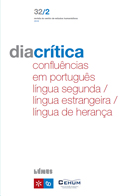Portuguese as a host language for senegalese migrants in Rio Grande, RS, Brazil
DOI:
https://doi.org/10.21814/diacritica.5132Keywords:
Portuguese as a host language, University extension project, Senegalese migrantsAbstract
This paper results from reflections on a university extension project to promote the integration of these people in the local culture through Portuguese learning/teaching. This project was also aimed at offering linguistic grounds for social interaction in Portuguese; providing contact with work-related text genres; and improving reading competences in texts addressing work and daily life. Thus, theoretical background from Interactional Sociolinguistics (Gumperz 1982) and Cultural Anthropology (Matta 2001) have been considered here. From the pedagogical point of view, this work was based upon the Task-based Approach (Janowska 2014; Willis 1996) has been chosen to solve specific needs of the group. In general, it was easy for the students to learn new words, but they showed some difficulties on the phonetic and phonological levels, such as distinguishing /z/ from /ʒ/; /s/ from /ʃ/; /l/ from /ʎ/. As to social impact, this project helped some students find formal jobs.
References
Amado, R. S. (2011). Português como segunda língua para comunidades de trabalhadores transplantados. Revista da SIPLE, 2(1), pp. 0-0. Available at: http://www.siple.org.br/index.php?option=com_content&view=article&id=173:portugues-como-segunda-lingua-para-comunidades-de-trabalhadores-transplantados&catid=57:edicao2&Itemid=92. Accessed on April 28, 2014.
Andrighetti, G. H. (2012). Reflexão sobre o ensino de português para falantes de outras línguas através da pedagogia de projetos. In J. Schoffen et al. (Eds.), Português como língua adicional: reflexões para a prática docente (pp. 71-90). Porto Alegre, Brazil: Bem Brasil.
Bezerra, I. C. R. M. (2003). Aquisição de segunda língua de uma perspectiva linguística a uma perspectiva social. Soletras, 5(6), 31-53.
Capilla, M. C. C. (2010). O efeito da língua materna na aquisição de línguas próximas. Revista Intercâmbio dos Congressos de Humanidades XII, 3(1), 1-12. Available at: https://www.academia.edu/1575732/O_EFEITO_DA_L%C3%8DNGUA_MATERNA_NA_AQUISI%C3%87%C3%83O_DE_L%C3%8DNGUAS_PR%C3%93XIMAS. Accessed on February 10, 2018.
Clements, N. & Hume, E. (1995). The internal organization of speech sounds. In J. Goldsmith (Ed.), Handbook of phonological theory (pp. 245-306). Oxford, England: Blackwell.
Contreras, M. (1998). As armadilhas que podem ser oferecidas pela proximidade dos idiomas - A interlíngua oferecida como insumo nas aulas de Língua Espanhola como LE (Dissertação de mestrado, Universidade Católica de Pelotas).
Feitosa, J., Marra, J., Fasson, K., Moreira, N., Pereira, R. & Amaro, T. (2015). Pode Entrar. Available at: http://www.acnur.org/portugues/wp-content/uploads/2018/02/Pode_Entrar_ACNUR-2015.pdf. Accessed on September 12, 2018.
Grenoble, L. A., Martinović, M. & Baglini, R. (2015). Verbal gestures in Wolof. In R. Kramer, E. C. Zsiga, & U. T. Boyer (Eds.), Selected Proceedings of the 44th Annual Conference on African Linguistics (pp. 110-121). Somerville, United States: Cascadilla Press.
Grosso, M. J. R. (2010). Língua de acolhimento, língua de integração. Horizontes de Linguística Aplicada, 9(2), 61-77. DOI: https://doi.org/10.26512/rhla.v9i2.886
Gumperz, J. J. (1982). Language and social identity. Cambridge, England: Cambridge University Press.
Instituto Brasileiro de Geografia e Estatística (2012). Censo demográfico 2010. Características gerais da população, religião e pessoas com deficiência. Available at: https://cidades.ibge.gov.br/brasil/rs/rio-grande/panorama. Accessed on September 12, 2018.
Janowska, I. (2014). Tarefa: Um conceito-chave da perspectiva acional. (Trans.) E. Nadalin & J. C. Moreira. Revista X, 0.214(2). Dossiê Especial – Didática sem Fronteiras. DOI: https://doi.org/10.5380/rvx.v2i0.2014.40330
Jardim, D. F. (2007). Cartografias da imigração: Interculturalidade e políticas públicas. Porto Alegre, Brazil: Editora da UFRGS.
Jornal da Cidade Online (2017). Senegaleses têm seus produtos apreendidos, são agredidos e presos por fiscais e PMs em Passo Fundo/RS. Available at: https://www.youtube.com/watch?v=wPWN7NVpNYY. Accessed on September 13, 2018.
Jornal Futura (2015). Senegaleses e haitianos encontram dificuldades no Brasil.
Ka, O. (1989). Wolof syllable structure: Evidence from a secret code. Eastern States Conference on Linguistics (ESCOL’88), 5(1), 261–274.
Lima, E. O. O. F., Rohrmann, L., Ishihara, T., Iunes, S. A. & Bergweiler, C. G. (2010). Novo Avenida Brasil 1: Curso básico de português para estrangeiros. São Paulo, Brazil: EPU.
Maia, V. S. (2012). "Tu vai para onde?... Você vai para onde?": manifestações da segunda pessoa na fala carioca (Master's thesis, UFRJ/FL).
Marin, S. (2010). Wolof consonant alternation: The case of continuancy. Working Papers of the Linguistics Circle, 20(1), 89-98.
Matta, R. (2001). O que faz o Brasil, Brasil? Rio de Janeiro, Brazil: Rocco.
Ngom, F. (2010). Ajami scripts in the Senegalese speech community. Journal of Arabic and Islamic Studies, 10(1), 1-23. Available at: https://www.journals.uio.no/index.php/JAIS/article/view/4599/4043. Accessed on June 20, 2018. DOI: https://doi.org/10.5617/jais.4599
Reinoldes, M., Mandalá, P. & Amado, R. (2017). Portas Abertas: português para imigrantes. São Paulo, Brazil: USP.
Schoffen, J., Kunrath, S., Andrighetti, G., Santos, L. (2012). Português como língua adicional: reflexões para a prática docente. Porto Alegre, Brazil: Bem Brasil.
Willis, J. (1996). A flexible framework for task-based learning. In J. Willis & D. Willis (Eds.), Challenge and change in language teaching. Oxford, England: Macmillan Heinemann. Available at: <https://www.academia.edu/30503745/A_flexible_framework_for_task-based_learning_An_overview_of_a_task-based_framework_for_language_teaching>. Acedido em: 16 mar. 2018.
Downloads
Published
How to Cite
Issue
Section
License
Copyright (c) 2023 Lúcia Lovato Leiria, Luciana Pilatti Telles, Adriano Luz Ribeiro de Freitas

This work is licensed under a Creative Commons Attribution-NonCommercial 4.0 International License.










